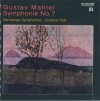 Mahler – Symphony No.1
Mahler – Symphony No.1
SWR Sinfonieorchester Baden-Baden and Freiburg; Francois-Xavier Roth
Hänssler ClassicCD 93.294
Mahler – Symphony No.7
Bamberger Symphoniker; Jonathan Nott
Tudor7176
Mahler – Symphony No.3
Michaela Schuster; Gurzenich-Orchester Koln; Markus Stenz
Oehms ClassicsOC 648
 Though the double anniversaries of Gustav Mahler’s birth (1860) and death (1911) have now drawn to a close the hits keep on coming. A new Hänssler disc of the First Symphony commemorates the inaugural concert of French conductor François-Xavier Roth, recently appointed chief conductor of the Baden-Baden based radio orchestra, a highly accomplished ensemble well known for its expertise in contemporary music. Roth’s approach to Mahler is typically rigorous and hard-driven, a strategy well suited to the bucolic Scherzo and sure-fire finale but one which gives short shrift to the emotive plasticity and elegant phraseology a true Mahlerian such as the late Rafael Kubelik brought to the other movements. The album includes a bonus performance of a rarely-heard early work by Anton Webern, In Sommerwind (1904), notable for its surprising French influences and sprawling episodic structure.
Though the double anniversaries of Gustav Mahler’s birth (1860) and death (1911) have now drawn to a close the hits keep on coming. A new Hänssler disc of the First Symphony commemorates the inaugural concert of French conductor François-Xavier Roth, recently appointed chief conductor of the Baden-Baden based radio orchestra, a highly accomplished ensemble well known for its expertise in contemporary music. Roth’s approach to Mahler is typically rigorous and hard-driven, a strategy well suited to the bucolic Scherzo and sure-fire finale but one which gives short shrift to the emotive plasticity and elegant phraseology a true Mahlerian such as the late Rafael Kubelik brought to the other movements. The album includes a bonus performance of a rarely-heard early work by Anton Webern, In Sommerwind (1904), notable for its surprising French influences and sprawling episodic structure.
Sad to say, there is some question as to whether this radio orchestra will survive much longer in light of austerity measures recently proposed by the state broadcasting authority. Petitions are flying to ensure its continuation and contemporary German composers are in a panic. Let us hope they have more of an impact than we observed here in Canada some years ago.
Though we have not received their discs at The WholeNote, I feel compelled to mention the ongoing Mahler cycle by another financially challenged orchestra, the Pittsburgh Symphony under the direction of Manfred Honeck on the Japanese audiophile Exton label, available from the orchestra’s website. Honeck’s visceral interpretation of the First symphony deeply impressed me when I first heard it (the Pittsburgh orchestra boasts a fabulously lusty sounding horn section, an essential component in this work); superlative performances of Symphonies Three, Four and Five are also available.
British conductor Jonathan Nott, director of the Bamberg Symphoniker for the past decade, has passed the halfway mark in his cycle of live performances of the complete Mahler symphonies with the release of the Seventh Symphony. I’ve not heard the others, but on the present evidence his is a no-nonsense, objective approach, more intellectual than passionate. Much depends on the orchestral musicians in such a case; thankfully, the Bamberg artists do not disappoint and the recorded sound is decent enough. Yet one has to ask of this conductor, where is Mahler? Nott’s novice shortcomings (this is evidently his first ever performance of this work) are painfully evident in the Finale, which flies by in a blur, missing the many textural details and eccentric mood swings of Mahler’s mock triumphalism. You might almost think this is the black sheep of the cycle, as the contentious liner notes suggest. Try any performance of this work by Abbado (preferably the most recent Lucerne Festival DVD) and you’ll become convinced otherwise.
I’ve saved the best for last: a real winner of a disc from Markus Stenz and the wondrous Gürzenich orchestra in a compelling performance of the Third Symphony featuring contralto Michaela Schuster and an ensemble of children’s voices from the Cologne Cathedral and Opera choirs. The first five of the symphonies and a disc of vocal works have been recorded in the Stenz cycle so far; all are excellent, but this one in particular has a surpassing beauty. Stenz has a deep understanding of Mahler which shines through and the admirable sonic engineering is spectacularly transparent. Tempi are refreshingly nimble in the inner movements, lending a delightfully Shakespearian sense of fantasy to Mahler’s symphonic cosmos; there’s nary a dull moment over the course of this mighty, six movement double CD performance. From the opening depiction of summer’s awakening to the deeply felt, amorous conclusion, Stenz and his magnificent orchestra bring us sheer delight from first to last.
— Daniel Foley




